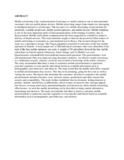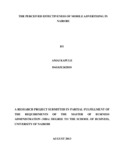| dc.description.abstract | Mobile advertising is the communication of messages or media content to one or more potential
customers who use mobile phone devices. Mobile advertising ranges from simple text messaging
to intelligent interactive ad messages. The key parts of a mobile advertising system include the
advertiser, a mobile ad network, mobile system operators, and mobile devices. Mobile telephony
is one of the most important mode of telecommunications in Developing Countries, thus in
Kenya indeed. Mobile (cell) phone communication has been suggested as a method to improve
delivery of health services. This study therefore sought to find out the perceived effectiveness of
mobile advertising to consumers as a promotional tool in Kenya. The research design for the
study was a descriptive design. The Target population consisted of customers of the four mobile
operators in Nairobi. A total sample size of 200 Individual customers who were subscribers from
each of the four mobile operators was used. A sample of 50 subscribers from all the four mobile
subscribers in Nairobi namely Safaricom, Airtel, Orange and Yu Mobile was used.
Questionnaires contained both structured and unstructured questions. The questionnaires were
self-administered. Data was analyzed using descriptive statistics. An effective mobile advertising
is a combination of goals, statistics, creativity and an intuitive knowledge of the mobile consumer.
The study recommends that there is need to customize mobile advertisements to particular
customer segments or even specific individuals based on available information such as
demographics, past behaviors, and interests. The study found that the mobile subscribers respond
to mobile advertisements they receive. This they do by donating, going for the event as well as
visiting the stores. The factors that determine the customers’ decision to respond to the mobile
advertisements include relevance, costs, intrusive nature, permissions and other reasons like
security and compatibility. The study further established that involvement, feelings/interest to
product, attitude, satisfaction, confidentiality, advert source, location & time, message appeal,
risk factors, coverage motivation, permission/legality and interactivity affect mobile advertising
effectiveness. As such the mobile advertising can be described as being mainly informative,
entertaining and intrusive. The study recommends that there is need to customize mobile
advertisements to particular customer segments or even specific individuals based on available
information such as demographics, past behaviors, and interests | en |


